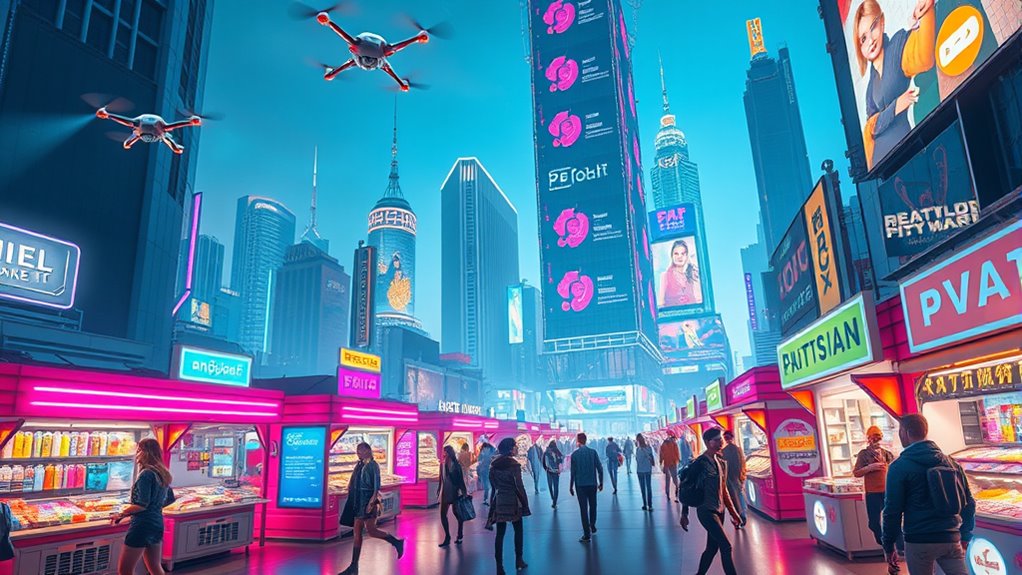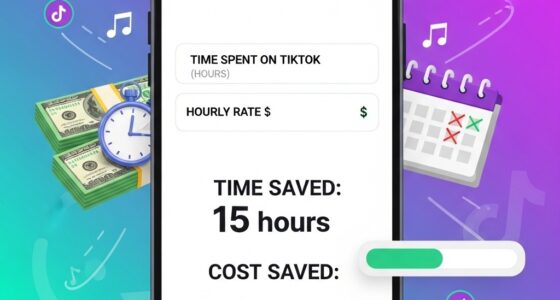Welcome to the metaverse marketplace where you can explore immersive virtual environments for buying, selling, and trading digital assets like NFTs, virtual land, and in-game items. Built on blockchain technology, it guarantees authentic ownership and smooth transactions. You can enjoy interactive experiences such as virtual galleries, auctions, and avatar-based shopping. As this rapidly growing industry evolves, discovering more will reveal how it’s transforming digital commerce and social interactions beyond reality.
Key Takeaways
- The metaverse marketplace offers immersive virtual environments for buying, selling, and trading digital assets beyond physical reality.
- Users can explore virtual land, NFTs, and in-game items through avatars and interactive experiences.
- Blockchain technology ensures secure ownership and seamless transfer of digital assets in the metaverse.
- Major brands are creating virtual stores and social events, blending commerce with entertainment.
- The metaverse transforms traditional shopping into a boundary-free, fully immersive digital experience.

The metaverse marketplace is revolutionizing how you buy, sell, and trade digital assets like virtual land, in-game items, and NFTs. These platforms are digital hubs built on blockchain technology that guarantee ownership authenticity and make transferring assets across different metaverse worlds seamless. Whether you’re interested in digital art, gaming collectibles, virtual real estate, or branded digital products, these marketplaces let you explore, acquire, and monetize assets in immersive environments. You don’t just browse; you engage via avatars, attend virtual galleries, participate in auctions, or preview games, making transactions more interactive and dynamic than ever before.
The metaverse marketplace transforms buying, selling, and trading digital assets through immersive, blockchain-powered experiences.
Different types of metaverse marketplaces cater to specific interests. NFT art and gaming marketplaces focus on digital art, video, audio, and game-related NFTs, allowing collectors to buy unique pieces or limited-edition assets. Virtual real estate platforms let you purchase, rent, or auction parcels of digital land, which you can customize with structures or use for commercial, artistic, or social purposes. E-commerce marketplaces provide immersive shopping experiences where you can try on products on your avatar, explore virtual showrooms, or attend live social shopping events. Enterprise marketplaces serve businesses, offering virtual land, branding NFTs, and hosting events to connect with audiences in innovative ways.
The industry’s growth is staggering, with projections estimating a $325 billion market opportunity between 2025 and 2030. As the metaverse expands, it’s set to transform how businesses operate, from sales and marketing to collaboration and training. The infrastructure supporting these marketplaces includes devices, software, and support services, all aimed at creating seamless digital experiences. Virtual real estate, for example, can be bought with cryptocurrencies or traditional money, allowing owners to build customized structures for commercial or social use, and potentially benefit from property appreciation as communities grow. Recognizing the importance of financial aspects, many investors are exploring ways to monetize virtual assets and protect their investments.
Meanwhile, metaverse e-commerce is redefining shopping. Instead of browsing static websites, you interact with products in virtual showrooms, try items on your avatar, or join live social shopping sessions. Major brands like Dior, Ferragamo, and Charlotte Tilbury have launched their own metaverse stores, blending visual engagement with social interaction. The future of these marketplaces is also driven by innovations in technology such as augmented reality (AR) and virtual reality (VR), which enhance immersion and user engagement. In this evolving digital landscape, the metaverse marketplace isn’t just a new way to trade—it’s a fully immersive, boundary-free experience where reality is optional.
Frequently Asked Questions
How Secure Is My Data in the Metaverse Marketplace?
Your data’s security in the metaverse marketplace depends on the platform’s measures. They use multi-factor authentication, strict access controls, and identity verification to keep unauthorized users out. Sensitive info is encrypted, and privacy is prioritized from the start. However, decentralization and interoperability pose risks like data breaches and identity theft. Stay vigilant, use strong authentication, and keep an eye on platform updates to protect your personal data effectively.
Can I Customize My Virtual Avatar Beyond Standard Options?
You can definitely customize your virtual avatar beyond standard options. In fact, 58% of users choose platforms based on their customization capabilities, showing how important this is. You can modify appearances, clothing, expressions, and even transfer your avatar across platforms. Advanced tools like AI generation and 3D reconstruction let you create highly personalized, realistic avatars. This flexibility boosts your immersion and helps you express your unique digital identity.
What Are the Costs Associated With Virtual Property Transactions?
You’ll encounter costs beyond just the land price, including blockchain transaction fees like gas fees, which can vary from a few dollars to hundreds. You might also pay fees for minting NFTs, smart contract executions, and platform commissions. If you develop or upgrade your virtual property, expect expenses for construction, equipment, and maintenance. These costs can add up, so plan your budget accordingly to avoid surprises in your virtual real estate ventures.
How Do I Troubleshoot Connectivity Issues During Virtual Experiences?
If your virtual experience suddenly crashes or lags like a spaceship losing thrusters, start by checking your Wi-Fi. Make sure your headset and PC are on the same network, preferably 5 GHz. Restart your devices, update software, and verify cables are secure. Move closer to the router, disconnect other devices, or switch networks if needed. These quick fixes can turn a virtual disaster into a smooth voyage through the metaverse.
Are There Age Restrictions for Participating in the Marketplace?
Yes, there are age restrictions for participating in the marketplace. You must be at least 13 years old to create accounts on platforms like Meta Quest, Facebook, and Instagram. Children aged 10 to 12 can participate only through parent-managed accounts with supervision. Kids under 10 aren’t permitted to use Meta Quest devices or establish accounts. Age verification can be tricky, so always follow safety guidelines and parental controls to ensure appropriate access.
Conclusion
As you explore the metaverse marketplace, remember it’s like stepping into a world where reality is optional—where your imagination leads the way. Embrace the endless possibilities and creative freedom it offers, shaping your unique digital experience. Just as a painter uses a blank canvas, you can craft your own virtual universe. So, leap in confidently and make this new frontier your playground, because in the metaverse, anything’s possible.










